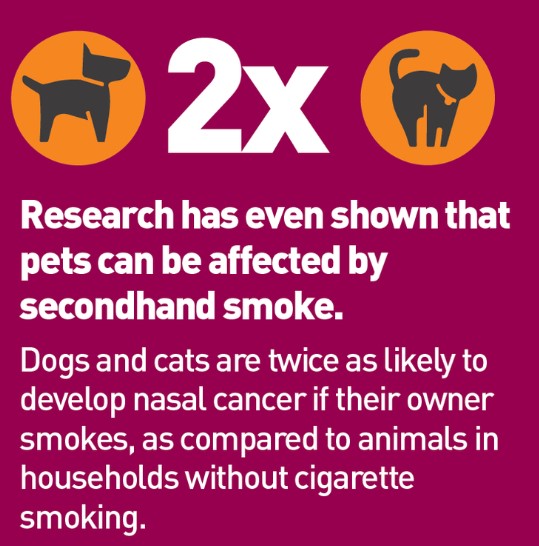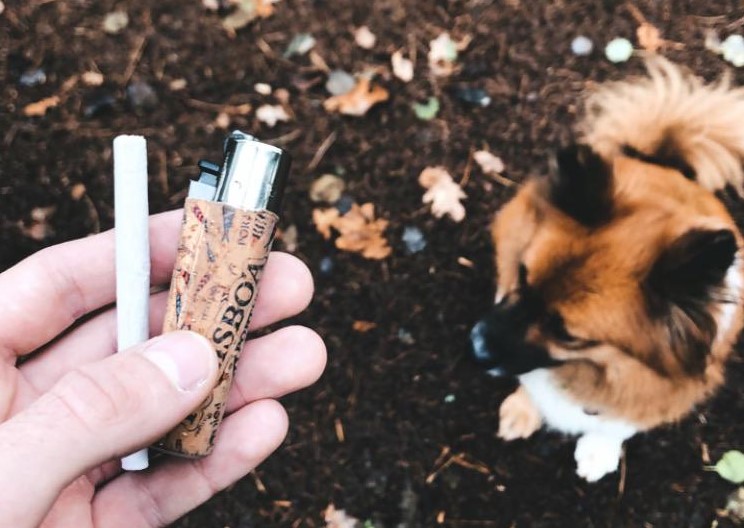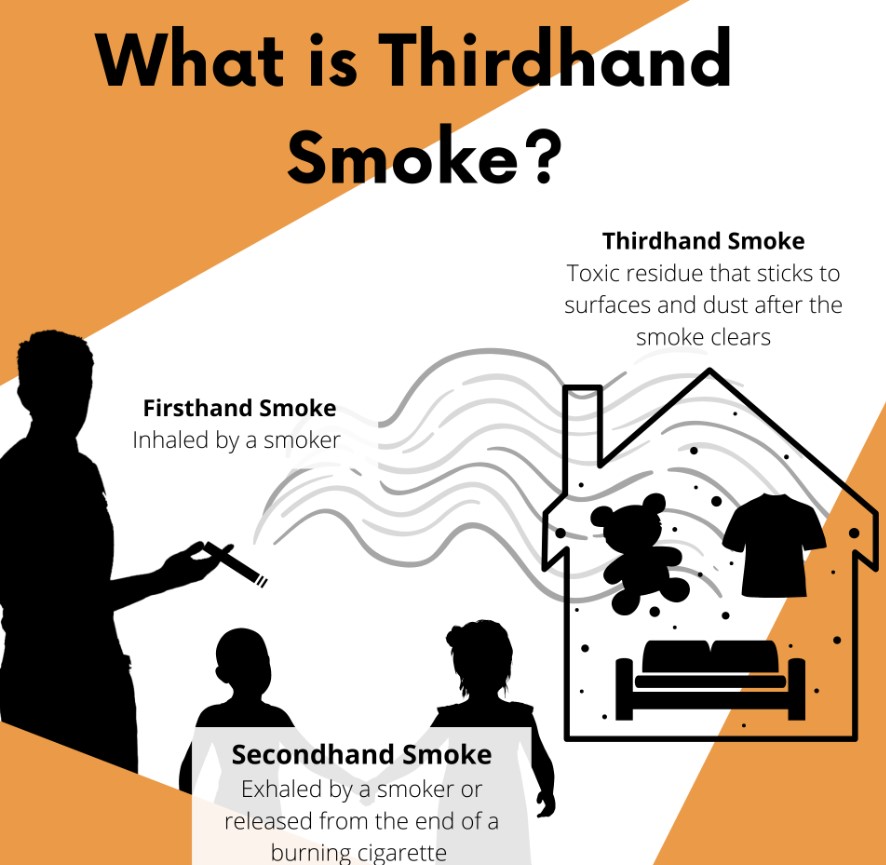Is weed smoke harmful to cats and dogs? Let’s explore this question as the accessibility and legalization of marijuana continue to grow. The curious nature of our pets may lead them to unintentionally ingest or inhale marijuana. This article delves into the effects of cannabis on cats and dogs, the risks of secondhand smoke, and underscores the crucial importance of keeping our furry friends safe.
Table of Contents:
Understanding Cannabis and its Compounds
How Does Cannabis Affect Cats, Dogs, and Other Animals?
The Dangers of Secondhand Smoke for Pets
Can Dogs Get High from Secondhand Smoke?
The Risks of Smoking Weed Around Cats
The Dangers of Thirdhand Smoke
Understanding Cannabis and its Compounds
Before exploring the impact of cannabis on pets, let’s familiarize ourselves with some key terminology. Cannabis is a genus of plants that includes marijuana and hemp. Marijuana refers to cannabis plants that contain high levels of tetrahydrocannabinol (THC) and cannabidiol (CBD). THC is the psychoactive compound responsible for the “high” associated with marijuana, while CBD is non-intoxicating and has gained popularity for its potential therapeutic benefits.
On the other hand, hemp is a low THC cannabis plant that contains higher levels of CBD. With these distinctions in mind, it’s important to note that THC is the primary concern when it comes to the effects of cannabis on pets.
How Does Cannabis Affect Cats, Dogs, and Other Animals?
To comprehend the potential dangers of cannabis for our furry companions, we must explore how it affects their bodies. Both humans and animals possess cannabinoid receptors, specifically CB1 and CB2 receptors, responsible for processing the effects of cannabinoids like THC.
Interestingly, dogs have a higher number of CB1 receptors compared to humans, making them more susceptible to the effects of cannabis. While research on cats is limited, they also possess these receptors, indicating that they too can be affected by THC.
When pets consume or inhale cannabis, the THC binds to these receptors, resulting in various neurological and physiological effects. Dogs, in particular, are more prone to intoxication from cannabis due to their higher number of CB1 receptors. The severity of the effects depends on factors such as the dosage, THC concentration, and the individual pet’s size and health.
The Dangers of Secondhand Smoke for Pets
Now that we understand how cannabis affects our furry friends, let’s address the risks associated with secondhand smoke. Just as secondhand tobacco smoke can be harmful to humans, secondhand marijuana smoke can also have detrimental effects on pets.
When cannabis is smoked in the presence of pets, they can inhale the smoke and absorb the THC through their respiratory system. This can lead to irritation of the lungs, respiratory issues, and even more severe conditions such as asthma and nasal cancer. Additionally, secondhand smoke can affect pets’ eyes, gastrointestinal tract, and overall well-being.
Can Dogs Get High from Secondhand Smoke?
One common question pet owners have is whether dogs can get high from smelling weed smoke. While it is possible for dogs to become intoxicated by inhaling secondhand marijuana smoke, it typically requires a significant amount of smoke in an enclosed space. However, it’s important to note that the effects of THC can vary among dogs, and there is no safe or minimal amount that can be considered harmless.
When dogs are exposed to marijuana smoke, they may experience symptoms such as drooling, vomiting, shaking, and even seizures. The effects can be distressing and confusing for them, as they do not understand the concept of getting high.
Is Weed Smoke Bad for Dogs?
Extensive research on the effects of marijuana smoke on dogs has been conducted since the 1970s. A study conducted in 1976 revealed that dogs exposed to daily marijuana smoke developed respiratory issues such as bronchitis, pulmonary emphysema, and even lung cancer over time. These findings suggest that smoking weed around dogs is not only undesirable but also poses serious risks to their health.
Exposure to marijuana smoke can cause respiratory irritation, low blood pressure, slow heart rate, and even seizures in dogs. It’s crucial to prioritize their well-being by avoiding smoking around them and ensuring they are not exposed to secondhand smoke.
Does Weed Smoke Affect Cats?
While research on the effects of marijuana smoke on cats is limited, it is evident that cats can be affected by THC exposure. Cats possess cannabinoid receptors similar to dogs and humans, making them susceptible to the effects of cannabis. However, the exact amount of marijuana smoke required to intoxicate a cat remains unclear and can vary depending on factors such as weight, age, and overall health.
A case study reported aggressive behavior and psychomotor agitation in a cat intoxicated by marijuana. The cat displayed alternating states of agitation and apathy, each lasting several minutes. These observations highlight the potential dangers of exposing cats to marijuana smoke.
The Risks of Smoking Weed Around Cats
It is strongly recommended to avoid smoking weed around cats. The American Society for the Prevention of Cruelty to Animals (ASPCA) emphasizes that cannabis is toxic to cats and other pets, and it is not safe for them to consume in any form. Remember, cats do not have the ability to make the conscious decision to consume THC, and exposing them to marijuana smoke can lead to a range of symptoms, including agitation, anxiety, vomiting, coordination difficulties, low blood pressure, seizures, and even coma.
Considering the potential risks and the lack of any known benefits, it is essential to prioritize the well-being of our feline companions and refrain from smoking marijuana in their presence.
The Dangers of Thirdhand Smoke
In addition to secondhand smoke, pet owners should also be aware of the risks associated with thirdhand smoke. Thirdhand smoke refers to the residue and particles left behind after smoking, which can be harmful when pets come into contact with them. These residues can settle on surfaces such as furniture, carpets, and clothing, posing a potential hazard to pets, especially those with sensitive noses.
While the specific effects of thirdhand smoke on pets have not been extensively studied, it is best to take precautions by avoiding smoking indoors and ensuring that any surfaces contaminated with smoke residue are thoroughly cleaned.
Keeping Your Pets Safe
To ensure the safety and well-being of our pets, it is crucial to take proactive measures to prevent cannabis intoxication accidents. Here are some essential tips for keeping your pets safe:
- Treat cannabis and THC-containing products as medications and store them securely out of your pet’s reach.
- Avoid leaving edibles, which can be particularly enticing to pets, accessible to them. Remember, these products may contain additional ingredients that are harmful, such as chocolate or xylitol.
- Refrain from smoking marijuana or any other substances around your pets. Choose well-ventilated areas when smoking indoors and ensure your pets are not present in the vicinity.
- Be cautious when growing cannabis plants indoors, as cats may be tempted to nibble on the leaves. Keep your plants secured and out of reach.
- If you suspect your pet has been exposed to marijuana or shows any signs of intoxication, contact your veterinarian immediately for guidance and assistance.
By following these guidelines, we can create a safe environment for our pets and minimize the risks associated with cannabis exposure.
Conclusion
In conclusion, it’s crucial to acknowledge the potential risks that cannabis, especially weed smoke harmful to cats and dogs, can pose to our pets. Dogs, cats, and other animals have cannabinoid receptors, making them susceptible to THC effects. Secondhand smoke can lead to respiratory issues in our furry friends.
Avoiding weed smoke around pets is strongly advised. Dogs may get intoxicated from inhaling secondhand weed smoke, and cats may exhibit aggressive behavior. To ensure pet safety, store cannabis products securely, refrain from smoking weed near them, and promptly seek veterinary help if signs of intoxication arise.
Prioritizing our pets’ well-being means maintaining an environment free from the risks of weed smoke harmful to cats and dogs. Always remember, our pets depend on us for protection and a nurturing space.







